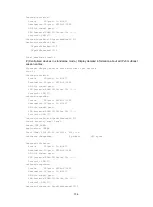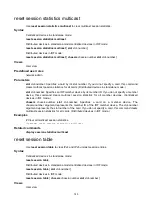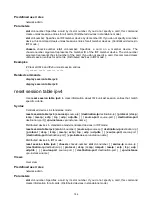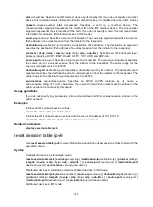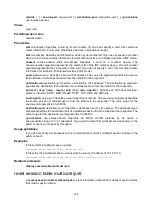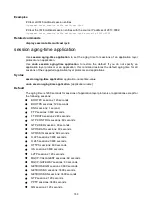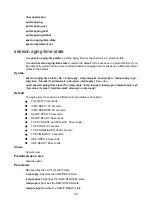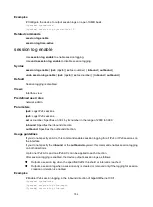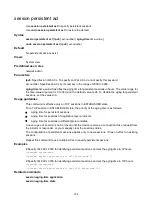
745
slot
slot-number
: Specifies an IRF member device by its member ID. If you do not specify a member
device, this command clears information for all member devices. (Centralized devices in IRF mode.)
chassis
chassis-number
slot
slot-number
: Specifies a card on a member device. The
chassis-number
argument represents the member ID of the IRF member device. The
slot-number
argument represents the slot number of the card. If you do not specify a card, this command clears
information for all cards. (Distributed devices in IRF mode.)
source-ip
source-ip
: Specifies a source IPv4 address. The
source-ip
argument specifies the source
IPv4 address of a unicast session from the initiator to the responder.
destination-ip
destination-ip
: Specifies a destination IPv4 address. The
destination-ip
argument
specifies the destination IPv4 address of a unicast session from the initiator to the responder.
protocol
{
dccp
|
icmp
|
raw-ip
|
sctp
|
tcp
|
udp
|
udp-lite
}: Specifies an IPv4 transport layer
protocol, including DCCP, ICMP, RawIP, SCTP, TCP, UDP, and UDP-Lite.
source-port
source-port
: Specifies a source port by its number. The
source-port
argument specifies
the source port of a unicast session from the initiator to the responder. The value range for the
source-port
argument is 0 to 65535.
destination-port
destination-port
: Specifies a destination port by its number. The
destination-port
argument specifies the destination port of a unicast session from the initiator to the responder. The
value range for the
destination-port
argument is 0 to 65535.
vpn-instance vpn-instance-name
: Specifies an MPLS L3VPN instance by its name, a
case-sensitive string of 1 to 31 characters. If you want to clear IPv4 unicast session entries on the
public network, do not specify this option.
Usage guidelines
If you do not specify any parameters, this command clears all IPv4 unicast session entries on the
public network.
Examples
# Clear all IPv4 unicast session entries.
<Sysname> reset session table ipv4
# Clear the IPv4 unicast session entries with the source IP address of 10.10.10.10.
<Sysname> reset session table ipv4 source-ip 10.10.10.10
Related commands
display session table ipv4
reset session table ipv6
Use
reset
session
table
ipv6
to clear information about IPv6 unicast session entries that match the
specified criteria.
Syntax
Centralized devices in standalone mode:
reset
session
table ipv6
[
source-ip
source-ip
] [
destination-ip
destination-ip
] [
protocol
{
dccp
|
icmpv6
|
raw-ip
|
sctp
|
tcp
|
udp
|
udp-lite
} ] [
source-port source-port
] [
destination-port
destination-port
] [
vpn-instance vpn-instance-name
]
Distributed devices in standalone mode/centralized devices in IRF mode:
reset
session
table
ipv6
[
slot
slot-number
] [
source-ip
source-ip
] [
destination-ip
destination-ip
]
[
protocol
{
dccp
|
icmpv6
|
raw-ip
|
sctp
|
tcp
|
udp
|
udp-lite
} ] [
source-port
source-port
]
[
destination-port destination-port
] [
vpn-instance vpn-instance-name
]
Distributed devices in IRF mode:
Summary of Contents for FlexNetwork MSR Series
Page 1005: ...987 ...






